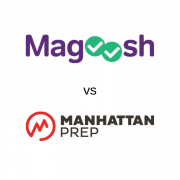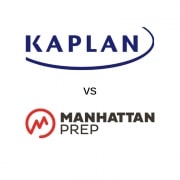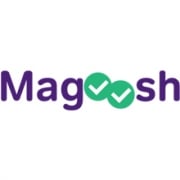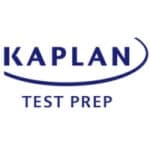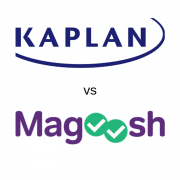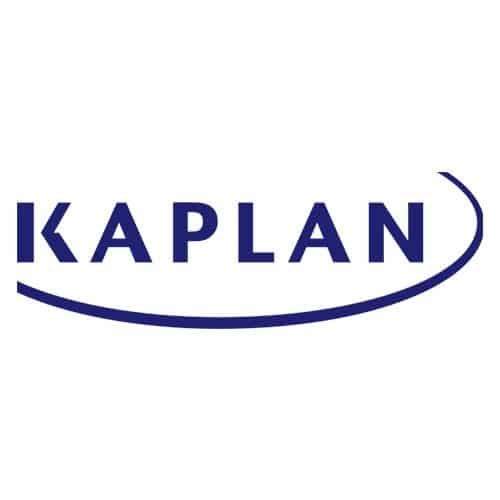
Kaplan GRE Prep
- 180+ hours of practice and teaching online
- 21 hours of live teaching in a classroom
- The GRE Channel has more than 40 hours of additional live and recorded training.
- 1v1 Instructor Attention
VS.

Princeton Review GRE
- 45 hours of live GRE expert teaching (Quant: 25 hours; Verbal: 20 hours)
- 20 hours of Quant and Verbal instruction
- 4,400+ exercises and test questions
- 8 complete practice exams
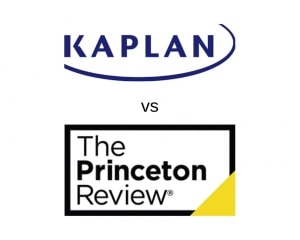
Studying for the GRE certainly isn’t easy, but to make the testing process a little more manageable, we’re going to guide you through a comparison of two of the best GRE test prep options on the market. If you’re looking for some more detailed information, be sure to read our in-depth reviews for both Kaplan and The Princeton Review, as well as our comparison of these courses against all the top GRE courses on the market. So, who’s the best? Well, let’s ring in Round 1!
Please note that some of the links included in this article are affiliate links, so we receive a small commission at no cost to you if you choose to purchase these products. Only use our links if you find this review helpful.
Cost
For the initial price comparison, we’ll look at the standard self-paced and live online test prep options offered by both Kaplan and The Princeton Review. Keep in mind that each of the platforms offers its own unique add-ons and specialty packages, which we’ll discuss in detail below.
The Princeton Review’s Self-Paced package runs at a $499 list price, which is slightly more expensive than Kaplan’s $449 Self-Paced test prep. However, The Princeton Review runs frequent sales for their products, and at the time of writing, you can get their Self-Paced GRE course for only $399 (sales with price cuts this deep are not uncommon, even for their most expensive courses). In terms of live online test prep, Kaplan initially runs cheaper at $999 compared to Princeton Review’s $1,199. However, at the time of writing, The Princeton Review’s Live Online course is $300 off, from $1,199 to just $899. So, in general, The Princeton Review’s list prices may seem a bit higher, but you’ll probably end up getting a course from them for cheaper than you would from Kaplan.
*Although The Princeton Review is cheaper on average, Kaplan provides an extra 2 months of access to their resources, which might be a deciding factor for you. Part of our goal is to show you that the right choice also depends on your schedule availability and learning style!
Course Access / Expiration
As we mentioned above, Kaplan offers 6 months of access to their online prep materials. With The Princeton Review’s packages, you’ll generally pay less, but will also receive only 120 days of access to their course materials—about 4 months. Each company offers options to retake a course or extend your access if you’re not satisfied with your progress or the product. We’ll dive further into each of their course guarantees below.
You should consider your unique schedule when deciding which course to buy, but for us, Kaplan gets the edge with their extra two months.
Winner: Kaplan
Books

When it comes to test prep, different studying platforms speak to different students. Even though things are constantly moving further online, some people still find it easier to learn from physical resources; if this sounds like your style, then this section is for you.*
Kaplan offers two primary textbook options, both of which can be found on their site or bought through Amazon. Their GRE Prep ($15) and GRE Prep Plus ($28) books offer test-taking strategies, a physical and an online practice test, and access to Kaplan faculty for Q&A sessions on their Facebook page. The Plus option adds an extra online test, Kaplan’s useful Qbank tool (see Practice comparison below), and a mobile-friendly prep platform.
In contrast, The Princeton Review has GRE book options ranging from $10-40, and carries the day on the strength of their versatility: they currently boast over 20 textbook options! From subject-specific drill books to comprehensive strategies and practice tests, the ability to choose the right book for you (at the right price) is a big win for book users.
Winner: Princeton Review
*We still encourage those who purchase books to combine their studying with an online prep course. Online courses are generally updated more frequently and provide great structured study plans that can make a huge difference in your GRE preparation.
Practice Questions
Practice questions are the heart of GRE prep. Kaplan puts their best foot forward in this category, offering students several individual practice options: their GRE Prep Qbank includes 2,500+ GRE questions and lets you customize quizzes according to difficulty and subject matter available in 1 month ($69) or 6 month options ($99); their Practice Test Pack includes up to 4 practice tests with question explanations and 3 ($149) or 6 ($199) months of access. As add-ons for those practice products, you can purchase their Math Foundations Course and Advanced Math Course for $299 each, which give you additional math practice, or you can choose their Official Test Day Experience ($129) add-on, which lets you take a simulated GRE test at a Prometric testing center.
While The Princeton Review does not offer separate practice packages (apart from the physical books described above), they do provide potential users with a free course trial that includes a practice test, a live seminar and 14 days of access to a sample of their online course materials. In terms of the practice materials provided in their courses, both The Princeton Review and Kaplan offer a plethora of content. Here’s a quick breakdown:
Kaplan: 8 recorded instructional video sessions, 5,000+ practice questions, QBank (which creates custom quizzes based on difficulty and subject), 7 full-length practice tests, 180 hours of online instruction and practice, Official Test Day Experience (in person, simulated practice test at a real test center), email-based support, GRE textbooks: GRE Complete, GRE Prep Plus, GRE Prep, and GRE Vocabulary Flashcards.
Princeton Review: 24 hours of recorded video lessons by GRE test experts, more than 470 practice drills, 8 full-length and adaptive practice tests, 3,500+ practice questions, and the unique Princeton Review higher score guarantee—“you will get a higher test score…or get your money back.” This guarantee can go a long way, as The Princeton Review also offers an entire year of access if you’re unsatisfied for ANY reason (regardless of score). See The Princeton Review’s website for more specifics on their guarantees.
Flashcards
Studying on-the-go can be crucial for today’s students, who often have busy schedules apart from their test prep. These days, flashcards are one of the most popular methods prep courses use to allow students an easy and efficient mobile prep method.
The Princeton Review offers customizable flashcards that are accessible within their online course materials. They don’t have a dedicated GRE mobile app, but just like with their practice question sets, you can purchase a physical pack of The Princeton Review’s GRE vocab flashcards. These 500-card packs focus on vocabulary and sentence structure and run for $13 on Amazon.
With Kaplan’s GRE course, your online materials come complete with free access to their mobile app, which provides their practice flashcards through a sleek phone-friendly interface. Kaplan’s flashcard library (also 500 cards) features common GRE vocabulary, context clues, and synonyms. It also allows you to customize your card stack and track your performance.
GRE Prep Course Formats
Both test prep companies offer a plethora of package and format options. Choosing the right one for you is important, but it can be challenging to sift through all of the courses on offer. Here is a quick breakdown of the options for each:
The Princeton Review GRE Prep Course Formats
- Self-Paced Online (
$499$399): Interactive video lessons; 8 computer-adaptive tests (with score reports); 2,750+ practice questions; curated lessons that respond to your unique subject performance - GRE Ultimate (
$1,199$899): All self-paced features plus 180+ hours of total instruction; 24 hours of live instruction; hundreds of drills; 3,500+ practice questions - Private Tutoring ($1,800, $2,499, $2,999, $3,000 or $4,899): Access to a personal instructor in-person or online for options of 10, 14, 15, 18, or 32 hours; The Princeton Review Guarantee; some options include a 162+ score guarantee
Kaplan GRE Prep Course Formats
- Self-Guided ($449): 40 hours video instruction; The Official Test Day Experience; 7 full-adaptive computer tests; 180+ hours of instruction; Qbank; 2 prep books; Self-Paced Plus Option includes foundational/advanced math lessons for an extra $250
- Online ($999): All self-paced features plus 40 hours of elective live instruction; Online Plus package includes 3 hours 1-on-1 tutoring and foundational/advanced math lessons for an extra $300
- In Person ($1,199): All online course features plus 21 hours of core classroom instruction; personalized homework assignments
- Private Tutoring ($1,799, $2,699, $3,499 or $4,199): Access to their complete Online course; a unique study plan with a personal GRE coach; 10, 20, 30, or 40 hours of tutoring in-person or online
Both companies use similar structures for their courses, although for our money, we see more overall value in The Princeton Review, as most of the features that make Kaplan’s courses competitive only come with their more expensive Plus package options.
Winner: Princeton Review
Video Lectures

When it comes to the quality and content of their respective recorded lectures, Kaplan and The Princeton Review go toe-to-toe. Both feature instructors with extensive knowledge of GRE strategies and teaching experience and combine 1-on-1 style lectures with mock classroom demonstrations and exercises. These help you feel like you’re in the room with the instructor, rather than just watching them through a screen.
Winner: Tie
Guarantees
Sometimes, test-taking doesn’t go as planned. If you find that your review course isn’t meeting the standards that you expected, or perhaps you don’t feel like you’ve reached the level of personal improvement you hoped for, you aren’t out of luck—you’ve got options to receive a full refund for your course, or even to redo it entirely!
With Kaplan, if your GRE score doesn’t improve after you’ve completed your course, you might qualify for a full refund. Or, if you’re simply unhappy with the GRE score or course for any reason, you may retake the same course at no additional charge. Keep in mind: if you choose the repeat option, you’ll no longer qualify for a refund. Their refund policy also has several other requirements and stipulations, so make sure to look at Kaplan’s website for their policy details.
The Princeton Review’s guarantees include everything you’ll see with Kaplan, and more. With The Princeton Review, if you complete a course and aren’t satisfied with the result (no matter your score), you can continue working on the course for up to one additional year. For most of their courses, The Princeton Review also offers a higher score guarantee similar to Kaplan’s—but this is where the similarities end, as The Princeton Review’s more expensive products include guarantees that are much stronger. Take their Quant 162+ package, for example, which promises a score on your GRE Quant section that’s at least 10 points above the national average, giving you confidence that you’ll not only improve with their course, but also stand out from the crowd. As you might expect, guarantees this strong come with a few conditions, so be sure to check the Princeton Review website for full information.
Winner: Princeton Review
X-Factor
As with any matchup, it isn’t best to just look at the stuff two opposing courses have in common to decide which is better. Most of the time, a course will have something truly unique, a feature or strength that the other course just doesn’t have an equivalent for—that’s their X-Factor.
Kaplan’s X-Factor comes in the form of their Qbank, a custom quiz creation platform. We’ve already reviewed the differences between the courses when it comes to practice materials, but the Qbank is something that goes above and beyond your standard practice question system, making it Kaplan’s X-Factor. With the Qbank, you can select certain levels of difficulty and certain subject areas to train yourself with, and even decide how long you want your quiz to be—then, Kaplan generates your custom quiz by pulling from thousands of practice questions. This level of customization allows you to test only the stuff you know you need to work on, and gives you plenty of freedom to decide how you want to do it.
The Princeton Review may not have a custom quiz bank, but they do have a quiz feature that sets them apart: DrillSmart technology. Their DrillSmart program is an adaptive quiz feature that tailors your questions to the difficulty level you need in order to improve. Now, this quiz system doesn’t allow you to customize your quizzes the same way that Kaplan’s does, but this drill feature accurately mimics the computer-adaptive sections you’ll find on the GRE. As we see it, this’ll give you a better idea of what is actually on the test; custom quiz questions can help you target specific areas, but won’t be quite as helpful on test day.
Winner: Princeton Review
Princeton Review vs Kaplan GRE Comparison Table
| Feature | The Princeton Review | Kaplan |
| Price | Affordable $499/$899 | $449/$999 |
| Course Access / Expiration | 120 Days | 6 Months |
| Physical Books | 20+ Available Textbooks | 2 Textbooks |
| Practice Questions | 2,500+ | 5,000+, Qbank |
| Flashcards | Online Access | Mobile Flashcards |
| Course Formats | Self-Paced, Live Online, In Person and Private Tutoring | Self-Paced, Live Online, In Person and Private Tutoring, Expensive Plus Options |
| Guarantees | Higher Score Guarantee, 162+ Guarantees | Higher Score Guarantees |
| X-Factor | DrillSmart Adaptive Quizzes | Qbank Customizable Quizzes |
Conclusion
The Princeton Review GRE: Best for Course Options
Looking through The Princeton Review’s GRE course products, it’s clear that they’re best for students looking for product versatility from their GRE course provider. Their GRE options come in so many formats and at a wide range of pricepoints—Kaplan, in comparison, offers slightly more expensive courses without as much variety in schedules and course styles. Go with The Princeton Review GRE if you need affordability, accessibility, and adaptability.
Kaplan GRE: Best for Amount of Material
For those looking for the largest amount of GRE practice material possible, Kaplan’s online GRE courses are probably the better bet. Kaplan boasts a massive amount of practice questions that you can study, but they also grant you access to your course material for a full 6 months. If you wanted that amount of material and study time with The Princeton Review, you’d probably have to buy GRE course books on top of your course. With that being said, Kaplan is the better choice if you want to study every part of the GRE over a long amount of time.
Overall Winner: The Princeton Review GRE
Now you’re wondering who’s the best overall, right? Kaplan offers their unique QBank, mobile accessibility, and an extra 2 months of access. But The Princeton Review offers students better prices and options across all formats, consistent discounts, a host of physical study materials, and multiple satisfaction guarantees. After reviewing each,
The Princeton Review wins in 5 of the 8 major categories, and beats out Kaplan as the better GRE course.
TAKE ME TO PRINCETON REVIEW GRE!

Check Weekly Offers on Princeton Review GRE Courses
More To Consider
Everything we do here is meant to help you prepare for YOUR test in YOUR way. Be sure to check out other pages on the site to learn more about tests, test prep services, and more. After reading this article, you may want to see our full head-to-head comparison of 7 leading GRE prep courses. Or, you could pay a visit to our current top-ranked GRE prep course: Magoosh. That way, you can see how The Princeton Review and Kaplan stack up to the #1 GRE course out there today. Now that you’re even more informed, it’s time to choose the right program for you and get ready to CRUSH the GRE!

TAKE ME TO THE TOP 7 GRE COURSES
FAQs on Kaplan vs Princeton Review GRE Prep Courses
Is Kaplan or The Princeton Review harder than the actual GRE?
Countless students have used both Kaplan and The Princeton Review’s GRE prep courses and benefited from their experience—these same students generally report their tests are helpful, but not identical to the actual GRE. Kaplan students have often reported that Kaplan’s practice GRE tests are a bit more difficult than the official test; this increased difficulty made the experience of taking the test a bit more manageable for Kaplan students.
Students with The Princeton Review, on the other hand, generally say that their practice tests are a little less difficult than the actual GRE. This might make their test day experience a bit more intense, but students also often report that The Princeton Review has exceptional AWA grading, increasing their scores for that section particularly. Overall, practice tests from both companies are fairly accurate and will familiarize you with the GRE, but Kaplan’s practice tests will be more difficult than the test on average, while The Princeton Review’s will be a bit easier.
Bryce Welker is an active speaker, blogger, and regular contributor to Forbes, Inc.com, and Business.com where he shares his knowledge to help others boost their careers. Bryce is the founder of more than 20 test prep websites that help students and professionals pass their certification exams.



